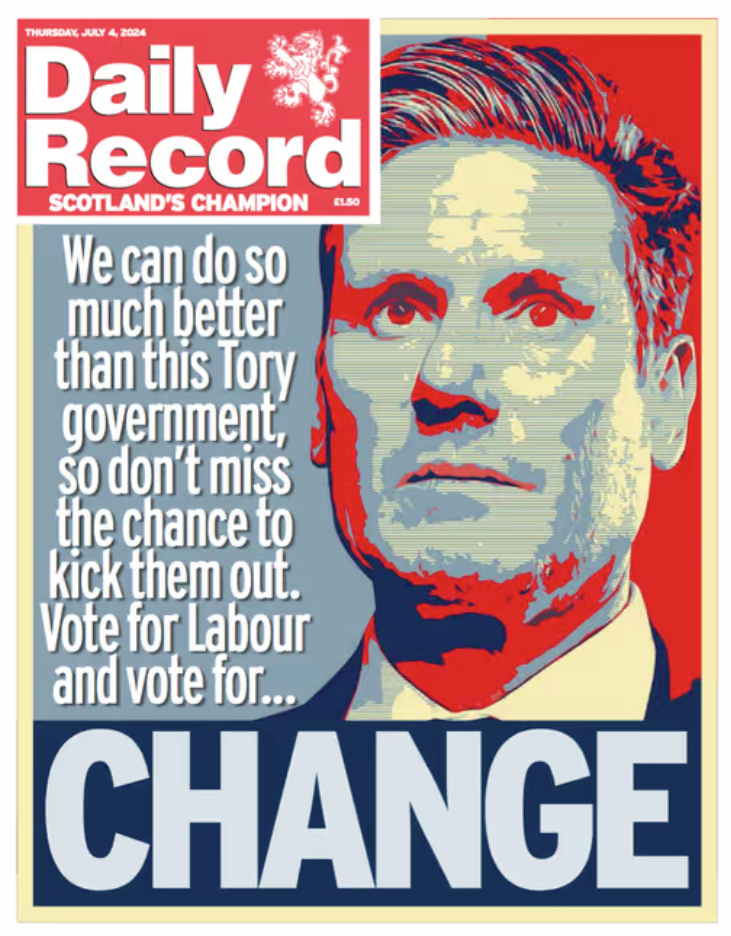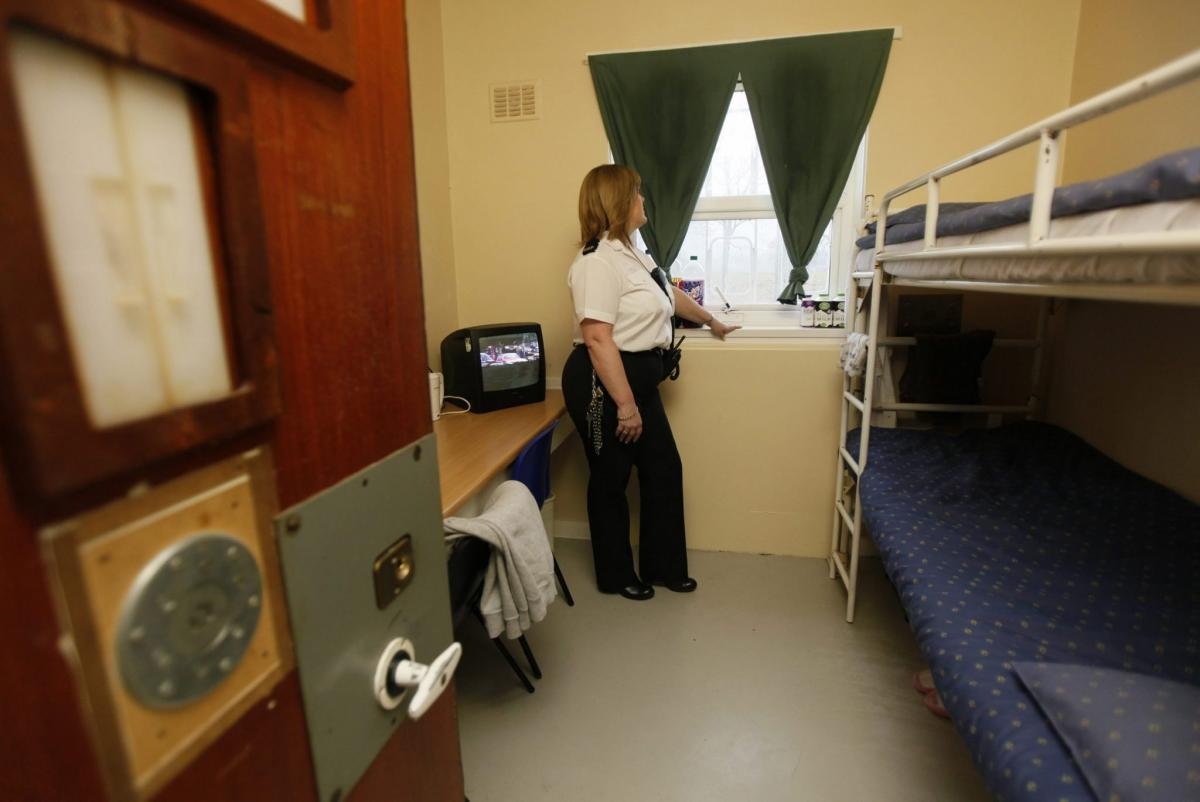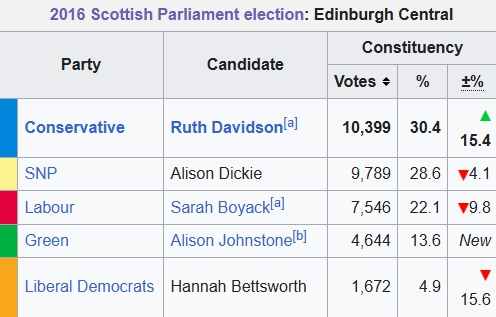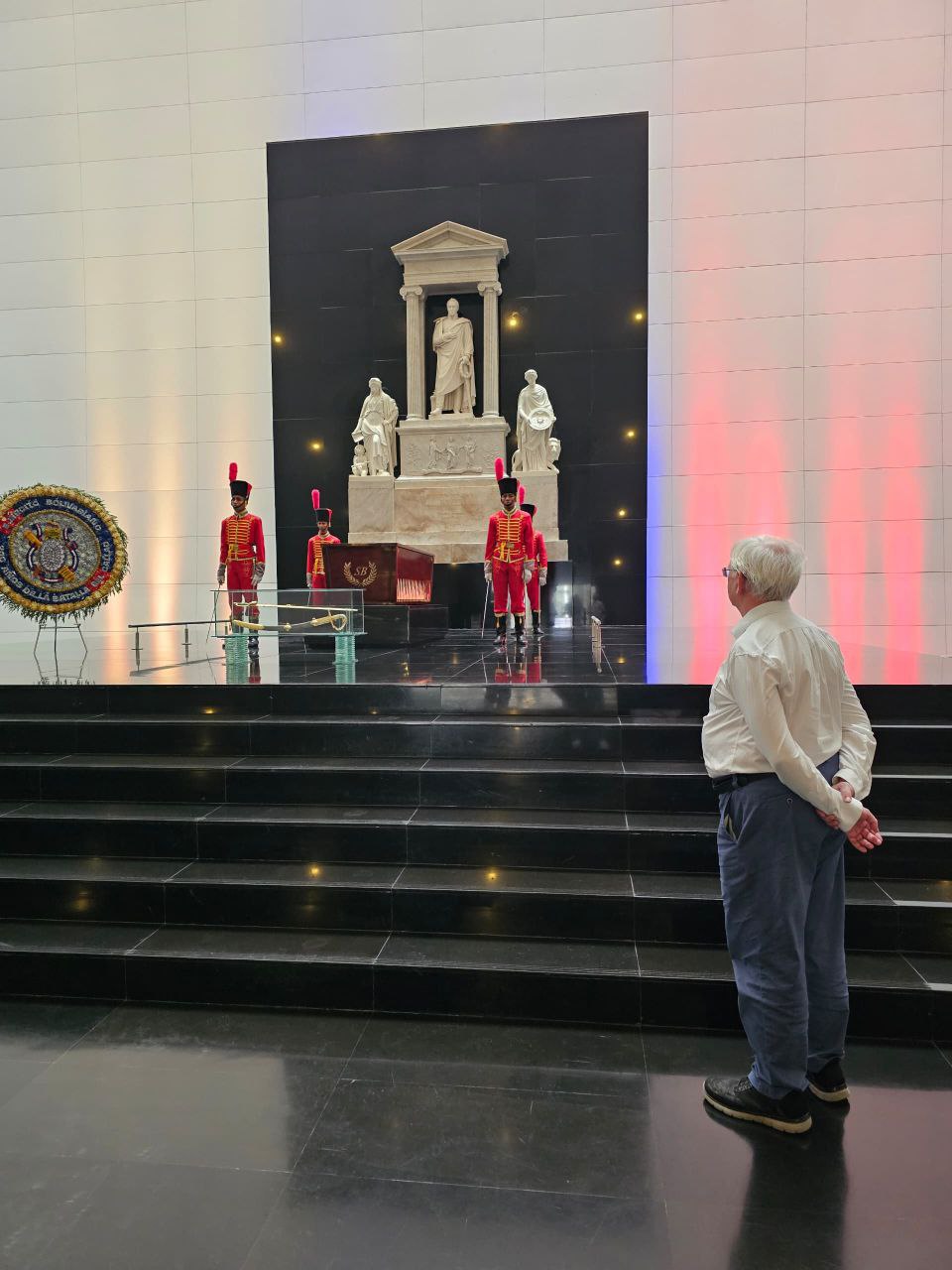Russell, Crowing from His Horse-box
Two years ago, I was convinced Angus MacNeil, Douglas Chapman, and Joanna Cherry were stick-ons to abandon Sturgeonism. Angus and Chris’s Plan B had been booed at conference, Douglas was lost in the black hole of the indyref fund, and Joanna was being simultaneously abused, threatened, and effectively barred from standing as an MSP. I also imagined,Continue reading "Russell, Crowing from His Horse-box"

Two years ago, I was convinced Angus MacNeil, Douglas Chapman, and Joanna Cherry were stick-ons to abandon Sturgeonism. Angus and Chris’s Plan B had been booed at conference, Douglas was lost in the black hole of the indyref fund, and Joanna was being simultaneously abused, threatened, and effectively barred from standing as an MSP.
I also imagined, rather naively, that there were at least 10-15 SNP MP/MSPs who had a sense of urgency about independence and who would cross the floor to join Alba. Just a few more high-profile names may have given the party the necessary publicity and validation to achieve a breakthrough at #Holyrood2021. These Alba MSPs could have had a huge effect at the Scottish Parliament, not least with the introduction of a referendum bill on day 1. Alas, it was not to be. Nicola Sturgeon’s vindictive post-trial slurs and insistence that she would not work with Alex Salmond, put paid to any hope of a Supermajority of pro-indy MSPs at Holyrood.
But you can only perceive so much from across the North Sea. I clearly over-estimated the courage and commitment of elected officials to the cause of independence.
Look, I’ll lay my cards on the table so you can choose to stop reading now, I’ve had it with the NuSNP – every last one of them. They are a party going through the motions. Each of Sturgeon’s drip-feed press conferences on the path to indy has been, at best, uninspiring. But we all know they’ve been much worse. As others have suggested, she’s setting us up to fail.
This past week has seen another massive own goal missed. The Tory government at Westminster is disintegrating before our eyes and the First Minister and the Westminster leader seem fixated on saving Britain.
If it wasn’t clear before, it certainly is now – the SNP is completely infiltrated, and its membership has been neutered. It’s over for them. There’s a growing sense that the damage done by Sturgeon and her accomplices is irreparable. Decent SNP members, along with the rest of the Yes movement, have been sold down the river just as the people of Scotland were by 110 votes to 69 in 1707. It’s perhaps hopeless putting our faith in a route to independence that involves any elected politicians.
After all, it’s the Scottish people who are sovereign. Other constitutional routes are available. But for our failed and failing representatives it may be simply too late

And it’s late afternoon at the Cafe Vivaldi in our neighbouring town of Hillerød. Fewer guests at this time of the day make for a quiet, early-evening meal. My wife’s just had her second Covid booster – and, help ma boab, fourth vaccination, at a nearby centre. As we wait for our food the topic turns to the upcoming Danish general election on 1 November. “You’ll finally be able to vote,” she reminds me. I admit that I’m still considering my options. “You should do the candidate test. TV2 have one online.” Sure enough, they do.
While she’s locating the test, I gaze in the direction of a large royal statue. It’s on the water’s edge with the fairytale-like Frederiksborg Castle in the background. The Danish king, Christian IV, was born at the castle in 1577.

Frederiksborg has long ceased to function as a live-in palace for the down-sizing Danish monarchy. These days it houses various cultural attractions and is very much a public building. In fact, all of the royal palaces are actually state property. The royals get a stipend to live on, well, the Queen does and she distributes it among a decreasing number of the entitled.

By the way, it was the sister of Frederiksborg-born Christian IV, Anne of Denmark, who married our James VI and became Scottish Queen in 1589. Not a happy marriage, but another interesting Scandinavian link with Scottish history, and it’s just across the square from where I’m sitting. From this perspective in the late afternoon sunshine, all looks well with the world.

There are thirty questions in TV2’s election test. You have 5 options for each answer from ‘strongly agree’ through ‘neutral’ to ‘strongly disagree’. After 30 questions, the party I apparently have most in common with is something called ‘Enhedslisten’. They are to the left. This was the same result I got before the recent local elections.
At a social event a few weeks ago, this party was described by my hosts and other guests as ‘almost Stalinist’! It was said in jest, but they explained that the Enhedslisten (which roughly translates as ‘Unity List’) is old school left wing. I’ve discovered it was originally an umberella for three old-time, moderate-to-radical leftist groupings. It first became a distict party in its own right in the early 1990s. With just over 9,000 members, it currently has 13 of the 179 seats in Folketinget. But more crucially, it’s one of the left-of-centre ‘support parties’ that’s helped keep PM Mette Frederiksen’s minority government in power.
“See, you do support their policies!” I was a little sheepish at my wife’s amusement at the result of the test. I reminded her of the recent Stalinist jokes made by HER friends. Sensing my discomfort, she suggested I do the one from the state broadcaster dr.dk. The result, unsurprisingly, was the same.
Enhedlisten came top (80% agreement) then ‘SF’, the Socialist People’s Party. My wife exclaimed, with undisguised glee, “You can’t deny the fact that you’re Ræve Rød” – the Danish expression for being ‘red as a fox’.
By the way, after 60 questions in two tests, only one dealt with gender issues. That was whether under 18-year-olds should be permitted to have ‘gender surgery’. A no-brainer there, unless of course you believe in medical experimentation on children and its irreversible consequences.
There were only two on foreign policy and the military. Rather surprising, since Denmark, appears to consider itself at war with Russia. As in much of the ‘collective West’ the term ‘Russian Federation’ is rarely mentioned here, it’s all ‘Putin’ this and ‘Kremlin’ that. Denmark, which both celebrates and prides itself on its constitutionally safe-guarded free speech, has, at the behest of the EU, shut down free speech by shutting off certain foreign broadcasters, presumably in the interests of free speech. Informed debate and balanced context is nowhere to be found regarding the current energy crisis and ongoing military confrontation between NATO and the Russian Federation. And in another untypically Danish move, Denmark, along with Germany and Sweden refuse to discuss the investigation into the NordStream pipeline saboteurs.

Anyway, the initial televised candidates’ debate on Danish TV is far more peaceful and informative. There were 14 (yes, fourteen) party leaders lined up. Only six of them are left over from four years ago. So, in all, eight of these candidates are new, and relatively inexperienced. Now here’s an interesting thing. It turns out that ‘Enhedslisten’ (you know, the ‘Stalinist’ party I apparently identify with) does not operate with a party leader. There’s collective leadership built on local and regional groups, who choose a ruling committee each year at the party conference. A really de-centralised, grassroots party. In place of a leader, a political spokesperson is chosen by the elected MPs.
To all intents and purposes, this spokesperson (currently Mai Villadsen) is perceived by the public as the party leader. It’s certainly a more nuanced approach, and clearly designed to avoid the type of catastrophe that’s befallen Scotland in the form of the centralising, ‘death-to-party-democracy’ Sturgeon.
This leadership system appeals to me. After all, who wouldn’t choose more grassroots influence – instead of an SNP party leadership more akin to monarchical absolutism?
However, Enhedslisten has yet another surprise in store. My pal Jesper, from the local sports club, told me that they are the only Danish party to have term limits for candidates. Something he really admires them for, even though they are not his chosen party. If elected to parliament, their candidates have a maximum of two terms – usually about 7 years and a bit, in all. Jesper, who runs a large financial services company in Denmark, will be voting for a party more to the right. Nevertheless, he praised Enhedlisten for being serious politicians with principles, and not just gravy-train, comfy-slippered careerists.
Imagine an SNP with term limits. It would probably have prevented the ongoing stasis on independence, not to mention the appalling increase in Pete Wishartism. The current SNP president stayed so long that even post-Holyrood he believes he can dictate a code of conduct for the entire Yes movement. But Russell, crowing from his horse-box, is no gladiator for indy.
On 1 November it will be just over three weeks since the election was called. Danish elections usually run in four-year cycles. This November’s election is seven months early, so to speak. This means that Denmark has held a referendum and an election within the past six months, both at short notice and without any undue drama. Where there’s a will, eh?
As mentioned, there will be 14 parties to choose from. In fact, three of them are new on the scene since the 2019 election. Of the 14, though, only three have – so far – designated prime ministerial candidates with a real chance of leading a coalition government of the right, left or centre. Yes, that’s 14 parties, three of them new since the last election, one of them led by a former prime minister. Unlike #Holyrood2021, all the parties receive print and broadcast media coverage. No one is ‘shut out’. An Alba-style media blackout would be unthinkable.
Danes use a form of D’Hondt that ensures the percentage of the national votes equates with the number of party seats. In their version, there is only one vote (not two as with Holyrood). You can vote for a particular party candidate or just put an X on the party. No votes are wasted.
Denmark has quite a low threshold for parliamentary representation at 2%. This means more parties will be elected, and thereby, a broader spectrum of views represented in the Folketing. By way of comparison, the cut off in Germany is 5%, with Sweden and Norway on 4% and Turkey as high as 10%. If a simplified D’Hondt system with a lower threshold was used in Scotland, we would perhaps see more niche parties elected. For example, since trans rights are claimed to be such a big issue, TRAs could stand on the courage of their convictions and on their own platform, instead of piggy-backing environmental and constitutional parties. Surely they believe they would gain 2% of the national vote? And why not a dedicated women’s rights party? Making up 50% of the population, and in the current climate, a women’s rights party would be a stick-on for seats in our new post-independence parliament.
All things will be possible in our Scotland with independence restored – also a reform of the voting system. In this context, Danish D’Hondt may be worth a study. After all, any system that consistently inspires an 80-90% turnout must be doing something right.
A book release has gone off like a political bomb in the middle of the three-week election campaign. The book,’The Spy Chief: Memories from Cell 18′, by the former head of military intelligence, Lars Findsen, is being ripped off the shelves. And it has put a rather large cat among the ministerial pigeons. If my understanding of this labyrinthine story is correct, information seeped out into the public domain regarding top secret operations on his watch. The body tasked to oversee the intelligence services, and whose job it is to prevent the security services becoming a state within a state, were concerned.

Historic illegal activities, not least ‘Operation Dunhammer’, were at the heart if the revelations. Dunhammer was the NSA project, through which, Danes facilitated US spying on European NATO ‘allies’, including France, Germany, Scandinavian neighbours, and even on Denmark’s own citizens. This, all done with the consent of successive Danish governments dating back to the Bill Clinton era.
A fascinating three-part documentary about the affair is running on national television. It covers issues between state and security state, and the damaging fall-out from Findsen’s book. It’s not at all flattering for the current government ministers involved.
In another bizarre twist, the suspended intelligence head, Findsen, has described how he was spied upon in his own home, and even at his summerhouse, by the domestic security organisation PET – an organisation he once led! This surveillance was highly intrusive and also recorded intimate details about his private life. It has been speculated that Findsen’s suspension, arrest, and imprisonment were politically motivated – perhaps to keep the ruling coalition from collapsing. Whether this new scandal, on PM Mette Frederiksen’s watch, will affect the election, remains to be seen. She certainly has more than the illegally euthanised mink population to worry about.
Our early dinner was pleasant. I suppose being red as a fox I should have chosen Cafe Vivaldi’s Chilean rouge. But I opted instead for a rather expensive glass of Sauvignon Blanc. It turned out to be blanc all right, but with hardly a trace of Sauvignon. I suppose with wines, as with politicians, you don’t always get what you expect.
My bike is parked outside. Mrs Red Fox has our old car parked over by the vaccination centre. For my part, the ride home is via the new scenic cycle route through the castle grounds. This route begins by the royal statue on the square overlooking the green copper spires of Christian IV’s Frederiksborg. The route avoids traffic, and then emerges, handily, outside Hillerød, where the forest path to our home town begins.
There’s definitely a chill in the air.
MY COMMENTS
Once again Peter provides a hugely readable, interesting article about Denmark, while at the same time making some highly topical comment on Scottish politics. I have learned a great deal from Peter’s articles and am interested to know more. This is the classic sign of great writing, sufficient to create interest, informative, while generating a desire to know more. I always look forward to receiving another article and my readers can be assured he will be informing us in due course of the outcome of the Danish elections and what impact they will have on Danish citizens. In return I will inform Peter if there is any movement from Mike Russell’s horsebox!
I am, as always
Yours for Scotland.
BEAT THE CENSORS
Unfortunately some pro Indy websites are not pro Indy. They are pro SNP sites and ban any content on their sites which dares to question the SNP or the SNP leader. They seek to censor discussion and free expression. Fortunately many of my readers share the articles on Yours for Scotland frequently and because of this the attempted censorship is proving ineffective. This support is very important and I thank everyone who share and protect freedom of speech and choice.
FREE SUBSCRIPTIONS
Are available on the Home and Blog pages of this site. This will ensure you will receive notification of all new posts by email and be the first to get key information when it is released.
SALVO
The progress of Salvo has been the most encouraging development of 2022. It is doing sterling work educating Scots about the Claim of Right and spelling out what it means that the Scottish people are sovereign, not any Parliament. All donations to this site for the remainder of 2022 will be forwarded to Salvo to support them in developing and expanding this valuable work.
LIBERATION.SCOT
Please register at Liberation.scot and join the mass membership organisation that will be the signatories to our application to the UN, debate and organise a new Scottish Constitution. The membership of Liberation is also where the first members of Scotland’s National Congress will be balloted for selection.
What's Your Reaction?











































